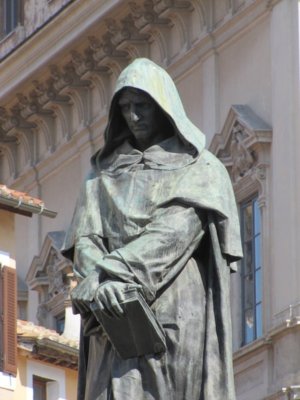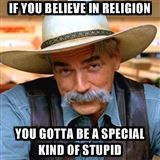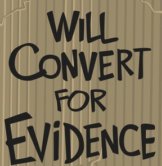



|
Giordano Bruno
Latin: Iordanus
Brunus Nolanus; 1548 - 17 February 1600), born Filippo Bruno, was
an Italian Dominican friar, philosopher, mathematician, poet, and
astrologer. He is celebrated for his cosmological theories, which
went even further than the then-novel Copernican model. He proposed
that the stars were just distant suns surrounded by their own
exoplanets and raised the possibility that these planets could even
foster life of their own (a philosophical position known as cosmic
pluralism). He also insisted that the Universe is in fact infinite
and could have no celestial body at its "center".
Beginning in 1593, Bruno was tried for heresy by the Roman Inquisition on charges including denial of several core Catholic doctrines (including the Trinity, the divinity of Christ, the virginity of Mary, and Transubstantiation). Bruno's pantheism was also a matter of grave concern. The Inquisition found him guilty, and on Ash Wednesday, 17 February 1600, in the Campo de' Fiori (a central Roman market square), with his tongue imprisoned because of his wicked words, Giordano Bruno was hung upside down naked before finally being burned at the stake. This is the famous Cunis Catholic Compassionate Care Program .
He had no last words because a metal clamp had been fastened to his tongue. He was carried to his killing on a mule; a tradition that probably evolved because many of the condemned could no longer walk after prolonged periods of torture prior to their execution. After being publicly stripped naked, Bruno was tied up at the center of the cobblestone plaza. The authorities opted to carry out his sentence at dawn - the square, which is today Rome's marketplace, located just a few blocks from where Julius Caesar was murdered, was not yet teeming with its daily hustle and bustle. Moments before the pyre was set ablaze, a cross was thrust in front of Bruno's face. He turned his head away from it in defiance, his death imminent. And as the chants of a religious congregation echoed across the execution grounds, the obstinate heretic was devoured by the inferno. After his death he gained considerable fame, being particularly celebrated by 19th- and early 20th-century commentators who regarded him as a martyr for science, though scholars emphasize that Bruno's astronomical views were at most a small part of the theological and philosophical beliefs that led to his trial. Bruno's case is still considered a landmark in the history of free thought and the future of the emerging sciences. In addition to cosmology, Bruno also wrote extensively on the art of memory, a loosely organized group of mnemonic techniques and principles. Historian Frances Yates argues that Bruno was deeply influenced by Arab astrology, Neoplatonism, Renaissance Hermeticism, and legends surrounding the Egyptian god Thoth. Other studies of Bruno have focused on his qualitative approach to mathematics and his application of the spatial paradigms of geometry to language. |
Send comments to:
 hjw2001@gmail.com
hjw2001@gmail.com
|











